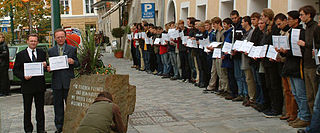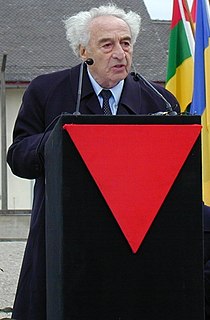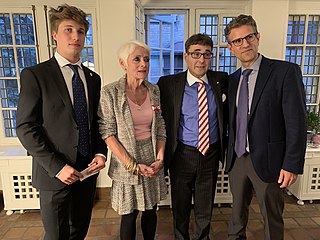
Mauthausen was a Nazi concentration camp on a hill above the market town of Mauthausen, Upper Austria. It was the main camp of a group with nearly 100 further subcamps located throughout Austria and southern Germany. The three Gusen concentration camps in and around the village of St Georgen/Gusen, just a few kilometres from Mauthausen, held a significant proportion of prisoners within the camp complex, at times exceeding the number of prisoners at the Mauthausen main camp.

Andreas Maislinger is an Austrian historian and political scientist and founder and chairman of the Austrian Service Abroad, including the Gedenkdienst, the Austrian Social Service and the Austrian Peace Service. He also is the founder of the Austrian Holocaust Memorial Award, the Braunau Contemporary History Days and the inventor of the idea of the House of Responsibility regarding the birthplace of Adolf Hitler.

The Austrian Service Abroad is a non-profit organization founded by Andreas Hörtnagl, Andreas Maislinger and Michael Prochazka in 1998, which sends young Austrians to work in partner institutions worldwide serving Holocaust commemoration in form of the Gedenkdienst, supporting vulnerable social groups and sustainability initiatives in form of the Austrian Social Service and realizing projects of peace within the framework of the Austrian Peace Service. Its services aim at the permanence of life on earth. The Austrian Service Abroad carries and promotes the idea of the House of Responsibility for the birthplace of Adolf Hitler in Braunau am Inn. The Austrian Service Abroad is the issuer of the annually conferred Austrian Holocaust Memorial Award. The program is funded by the Austrian government.

The House of Responsibility (HRB) in Braunau am Inn is the idea of establishing an international meeting place and a place of learning in the birth house of Adolf Hitler. People from all countries, backgrounds, religions and cultures should meet in order to discuss, learn and develop projects revolving around the concept of responsibility relating to the dimensions of past, present and future. The main demography shall be young people. The idea for a House of Responsibility originates from the founder of the Gedenkdienst and chairman of the Austrian Service Abroad Dr. Andreas Maislinger.
The Austrian Peace Service is one of the three sections of the non-profit organisation Austrian Service Abroad and offers a 6-12 months voluntary service at its partner institutions. Male Austrians may accredit their Austrian Peace Service as an alternative to the Austrian national or military service, provided their service abroad lasted a minimum of 10 months. Austrian Peace Servants are financially supported by the Austrian government.

The Austrian Holocaust Memorial Award (AHMA) was founded by the Austrian Service Abroad in 2006.
Bernard Offen in Kraków, Poland is a Holocaust survivor. He survived the Kraków Ghetto and several Nazi concentration camps.
The Amicale de Mauthausen is a French association in memory of the history of the Mauthausen-Gusen concentration camp.
The Action Reconciliation Service for Peace is a German peace organization founded to confront the legacy of Nazism.

The Auschwitz-Birkenau State Museum is a museum on the site of the Auschwitz concentration camp in Oświęcim, Poland.
Michael Prochazka is an Austrian social scientist and economist and vice-chairman of the Austrian Service Abroad.
Holocaust studies, or sometimes Holocaust research, is a scholarly discipline that encompasses the historical research and study of the Holocaust. Institutions dedicated to Holocaust research investigate the multidisciplinary and interdisciplinary aspects of Holocaust methodology, demography, sociology, and psychology. It also covers the study of Nazi Germany, World War II, Jewish history, religion, Christian-Jewish relations, Holocaust theology, ethics, social responsibility, and genocide on a global scale. Exploring trauma, memories, and testimonies of the experiences of Holocaust survivors, human rights, international relations, Jewish life, Judaism, and Jewish identity in the post-Holocaust world are also covered in this type of research.

International concentration camp committees are organizations composed of former inmates of the various Nazi concentration camps, formed at various times, primarily after the Second World War. Although most survivors have since died and those who are still alive are generally octogenarians, the committees are still active.

TheAssociation of Jewish Refugees (AJR) is the specialist nationwide social and welfare services charity representing and supporting Jewish victims of Nazi oppression, and their dependants and descendants, living in Great Britain. The AJR celebrated its 75th anniversary in 2016 with a series of events including a reception at the Wiener Library in London and a two-day seminar at JW3, also in London.
The International Youth Meeting Center in Oświęcim/Auschwitz is an educational institution whose campus lies between the center of the Polish city of Oświęcim and the former German concentration camp of Auschwitz. More than one million persons, mostly Jewish and Polish, were murdered at Auschwitz during the Second World War (1939–1945). Proposed in 1971, the center was opened in 1986 following years of planning, negotiations, and fundraising. It seeks to "develop the understanding of National Socialism and its consequences, particularly among young Germans, through dialogue and encounter between people of different origins", and is particularly engaged with Germans and Poles, Christians and Jews. In 2010, the Center hosted more than 17,000 overnight stays by youth groups participating in its programs. Many young Germans and Austrians have held year-long voluntary positions at the Center that satisfy their civilian service (Zivildienst) responsibility. One of these, Robert Thalheim, wrote and directed the German-language dramatic film And Along Come Tourists (2007) that features the center and its activities.

The organization of underground resistance movements in Auschwitz concentration camp began in the second half of 1940, shortly after the camp became operational in May that year. In September 1940 Witold Pilecki, a Polish army captain, arrived in the camp. Using the name Tomasz Serafiński, Pilecki had allowed himself to be captured by Germans in a street round up (łapanka) with the goal of having himself sent to Auschwitz to gather information and organize resistance inside. Under Pilecki's direction the Związek Organizacji Wojskowej, ZOW, was formed.
The Austrian Mauthausen Committee is responsible for scientific and educational work concerning the Mauthausen-Gusen concentration camp and its satellite camps in Austria. This association was founded in 1997 and is the subsequent organisation of the Austrian Concentration Camp Community Mauthausen.

The Memoriale della Shoah is a Holocaust memorial at the Milano Centrale railway station commemorating the Jewish prisoners deported from there during the Holocaust in Italy. Jewish prisoners from the San Vittore Prison, Milan, were taken from there to a secret underground platform, Platform 21, to be loaded on freight cars and taken on Holocaust trains to extermination camps, either directly or via other transit camps. Twenty trains and up to 1,200 Jewish prisoners left Milan in this fashion to be murdered, predominantly at Auschwitz.

Naomi Kramer is a Canadian curator and president of the Holocaust Education and Genocide Prevention Foundation.























